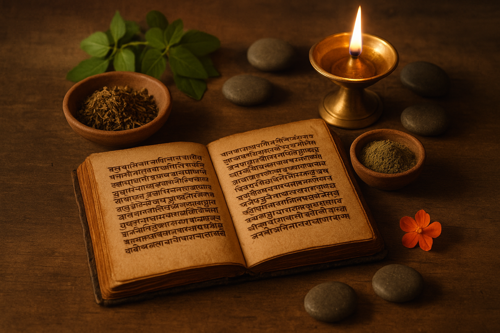What Is Ayurveda? Ancient Wisdom for Modern Wellness

You’ve probably heard the term tossed around in yoga classes or seen it printed on wellness tea packaging. Maybe your friend swears by something called "Ashwagandha," or you’ve stumbled upon a dosha quiz at 2 a.m. while scrolling through health blogs. But what is Ayurveda, really? And why does it seem like more and more people — from biohackers to burned-out office workers — are turning to it as if it’s the holy grail of balance and healing?
Well, here’s the short version: Ayurveda is an ancient holistic healing system that looks at the whole person — body, mind, and spirit — not just symptoms. And the long version? That’s what we’re diving into here. If you've ever wondered how to feel more grounded, energized, and, well, yourself, this 5,000-year-old science might just hold something for you.
In this article, we’ll break down the core ideas behind Ayurveda, explore its unique mind-body philosophy, and figure out whether any of it actually makes sense in the chaos of modern life. Along the way, I’ll share some personal thoughts and reflections — because honestly, this stuff gets weirdly real the more you learn about it.

What Is Ayurveda?
Definition and Historical Background
So, first things first: what is Ayurveda — literally? The word itself comes from Sanskrit: "Ayus" meaning life, and "Veda" meaning knowledge or science. So, Ayurveda translates to "the science of life." Not the science of disease — life. That’s a pretty important distinction. While modern medicine often kicks in once something’s broken, Ayurveda starts way before that — aiming to keep your entire system in harmony so things don’t break down in the first place.
Ayurveda’s roots run deep in Indian culture. It was developed thousands of years ago by sages who studied nature, the elements, human behavior, and the cosmos. There’s no single "founder" — it evolved as an oral tradition, passed down through generations, eventually compiled in texts like the Charaka Samhita and Sushruta Samhita, which are still referenced today. Yeah, that’s some serious longevity.
Ayurveda as a Holistic System of Health
Here’s where it gets interesting — or maybe confusing, depending on your worldview. Ayurveda doesn’t separate the mind and body the way Western medicine often does. It sees everything as connected. Your digestion affects your mood. Your thoughts influence your immune system. Your morning routine can shift your hormones. It’s all one big, interactive feedback loop.
In Ayurveda, disease doesn’t just "happen." It creeps in when there’s a loss of balance — between your internal energies, your environment, your diet, your sleep, even your thoughts. That’s what makes it a holistic healing system. It’s not just about treating illness — it’s about understanding yourself on a deeper level and adjusting how you live so that your natural state of health can return.
Is it scientific? Depends who you ask. Is it effective? That’s a better question. Plenty of people swear by Ayurvedic lifestyle changes, from improving digestion to reducing anxiety to just feeling more in sync. And hey, if it’s been around for 5,000 years, maybe there’s something to it, right?
The Doshas
Vata, Pitta, and Kapha
Alright, now here’s where Ayurveda gets a little... quirky. And honestly, a little bit magical too. It introduces the concept of doshas — three fundamental energies that govern all biological function. These aren’t just abstract ideas; they’re very real forces you can actually feel at work in your body if you start paying attention.
The three doshas are Vata, Pitta, and Kapha. Every person has all three doshas within them, but in unique proportions. That’s why some people are naturally slim and restless, others are fiery and intense, and some are calm and sturdy like a rock (seriously, you probably know someone for each).
Here’s the basic breakdown:
-
Vata = Air + Ether (Space)
Think movement, creativity, dryness, lightness.
When in balance: lively, imaginative, quick-thinking.
When out of balance: anxiety, constipation, dry skin. -
Pitta = Fire + Water
Think transformation, digestion, focus, heat.
When in balance: sharp mind, strong metabolism, leadership.
When out of balance: anger, inflammation, heartburn. -
Kapha = Earth + Water
Think structure, stability, nurturing, heaviness.
When in balance: calm, loyal, strong immunity.
When out of balance: sluggishness, weight gain, depression.
Honestly, once you start seeing people through the lens of doshas, it’s hard to unsee it. Your super-energetic friend who can’t sit still? Classic Vata. Your passionate, slightly hot-headed coworker? Total Pitta. Your sweet, steady friend who gives the best hugs but needs like 12 alarms to wake up? That’s 100% Kapha energy.

How Dosha Imbalance Affects Your Well-being
Here’s the kicker: when your doshas are balanced according to your natural constitution (your Prakriti), you feel good. Like, really good. Energy flows, digestion is smooth, sleep is restful, emotions are stable. You’re just... you, at your best.
But when things tip out of balance — too much Vata, too little Kapha, raging Pitta — that’s when symptoms crop up. Ayurveda believes most health issues are simply signs that your doshas need recalibrating.
It’s not always intuitive. For instance, if you’re feeling anxious (a Vata imbalance), you might be tempted to drink a lot of coffee to “power through.” But coffee is super Vata-aggravating! So you end up spiraling even further. Ayurveda teaches you to recognize these patterns and make choices that soothe, not stir up, your imbalances.
One of the coolest (and most humbling) things? Your dominant dosha isn’t inherently good or bad. Every dosha brings strengths and vulnerabilities. It’s not about "fixing" yourself — it’s about understanding your blueprint and living with it, not fighting it.
Core Principles of Ayurveda
Five Elements and the Mind-Body Connection
If you thought the doshas were deep, wait till you hear about the five elements that form the entire basis of Ayurveda. According to this ancient system, everything — you, me, the couch you’re sitting on, the rain tapping at your window — is made up of a blend of Earth, Water, Fire, Air, and Ether (Space).
Each dosha is a particular expression of two of these elements. That’s why Vata (Air + Ether) feels so light and mobile, while Kapha (Earth + Water) is heavier and more stable.
The mind-body connection? Totally inseparable here. Your thoughts are influenced by your physical health. Your body reacts to your emotions. It’s a feedback loop — and understanding your elemental makeup can help you decode why you’re feeling off and what to do about it.
One morning last winter, I woke up cranky, heavy, and sluggish. Classic Kapha overload. Instead of dragging through my day in a fog, I tweaked a few things: spicy food, vigorous movement, light clothes. By evening, my energy lifted. It wasn’t magic. It was applying simple Ayurvedic principles, based on understanding those underlying elements.
Balance, Prevention, and Harmony
Here’s something that I think makes Ayurveda quietly radical: it’s not disease-focused. It’s balance-focused. Health isn’t just the absence of disease — it’s a dynamic state of harmony where your doshas, your environment, and your mind are flowing together.
Ayurveda is obsessed with prevention. Little daily choices add up. Skip lunch one day? Fine. Make a habit of it, and eventually, digestion weakens, immunity drops, and boom — sickness. Small tweaks matter.
And it’s flexible. You’re not locked into a rigid system. You listen, adjust, observe. It's a lifelong conversation with your body. Some days you need grounding foods, other days lighter meals. Some seasons call for slower routines, others for fiery, passionate energy. Ayurveda gives you the tools, but trusts you to drive.

Ayurvedic Philosophy in Daily Life
Dinacharya: Daily Routines for Health
Imagine waking up without an alarm — naturally, energized. You start your morning by scraping your tongue (gross but weirdly satisfying), sipping warm water with lemon, meditating for five minutes, and doing a few yoga stretches. You eat a warm breakfast that feels just right for the season, and you go into your day feeling centered.
That’s Dinacharya — Ayurveda’s name for daily routines. They're designed to sync your body’s rhythms with nature’s cycles. Simple, doable stuff. Not some wild 2-hour ordeal (unless you want it to be).
And it’s surprisingly effective. Just one change — like adjusting your wake-up time closer to sunrise — can radically shift your energy.
Nutrition, Herbs, and Natural Practices
Food is medicine in Ayurveda. But it’s not just about "eating healthy" — it’s about eating for your dosha and the seasons. For example, cooling foods like cucumber and mint soothe fiery Pittas in summer. Warming spices like cinnamon and ginger support chilly Vatas in winter.
Herbs are also huge: Ashwagandha for stress, Triphala for digestion, Brahmi for mental clarity. But it’s not about throwing a bunch of powders into a smoothie. It’s about thoughtful, personalized use.
Natural practices like oil massage (Abhyanga) and nasal cleansing (Neti) might seem strange at first. But once you experience their calming, clearing effects? You kind of wonder why you ever lived without them.
Why Ayurveda Matters Today
In our hyper-connected, over-stimulated, screen-addicted world, a philosophy that says "hey, slow down, listen to your body, honor your nature" feels downright revolutionary.
Ayurveda in modern life isn’t about abandoning technology or living in a hut somewhere (although, honestly, some days that sounds tempting). It's about remembering that health isn’t manufactured in a pill or app. It’s built day by day, breath by breath, meal by meal.
If you're health-conscious, curious about alternatives, or just feeling off and can’t quite put your finger on why — exploring an ayurvedic lifestyle might open doors you didn’t even know were there.
Conclusion
So, what is Ayurveda? It’s a holistic healing system, yes. A timeless philosophy, sure. But maybe more than that — it’s an invitation. An invitation to know yourself better, live more intentionally, and trust that your body carries wisdom older than any trend.
You don’t have to overhaul your whole life. Maybe just start by noticing: how does your body feel today? What would nourish you right now? Ayurveda isn’t about rules. It’s about remembering.
Feeling intrigued? Start simple: take a dosha quiz, try an oil massage, or just swap your icy morning smoothie for a warm bowl of porridge. Tiny shifts, huge rewards.
FAQs
How can Ayurvedic philosophy be applied in daily life?
Start small. Adopt a simple morning routine, eat according to the seasons, and tune into your body’s signals. Ayurveda is all about practical, sustainable daily habits.
Is Ayurveda relevant in modern health practices?
Absolutely. Its focus on prevention, individualized care, and mind-body connection fills major gaps in modern healthcare.
Can Ayurveda be used with modern medicine?
Yes, many people integrate Ayurvedic practices with conventional treatments. Always consult your healthcare provider, especially when using herbs or supplements.
What are the basic principles of Ayurveda?
Balance the doshas, live in harmony with natural rhythms, prioritize prevention, and view the mind, body, and spirit as interconnected.
References
-
National Ayurvedic Medical Association (NAMA) -
Ayurveda Association of Canada -
The Ayurvedic Institute -
World Health Organization - Traditional Medicine
Got any more questions?
Ask Ayurvedic doctor a question and get a consultation online on the problem of your concern in a free or paid mode.
More than 2,000 experienced doctors work and wait for your questions on our site and help users to solve their health problems every day.

